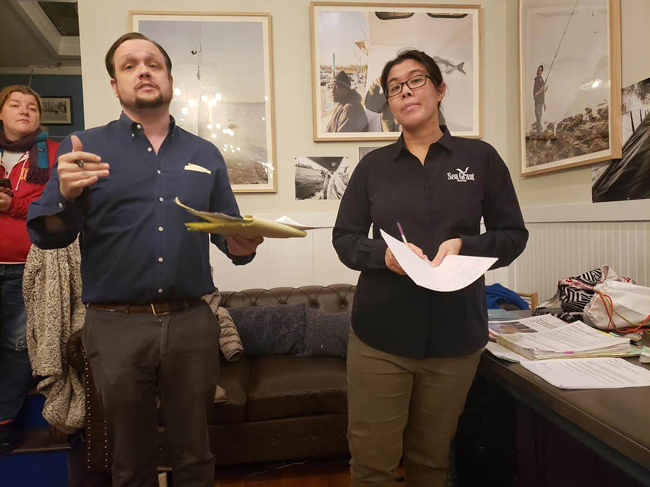
City Island Rising President and Helen Cheng of the New York Sea Grant speak at the City Island Rising meeting on March 12. Credit: Schneps Media / Jason Cohen
— By Jason Cohen, Bronx Times
Bronx, NY, March 19, 2020 - A non-profit environmental group is working with City Island to curb flooding by having citizens document images to help professionals identify the problem areas.
On Thursday, March 12, Helen Cheng of the Community Flood Watch Project, which is part of the Science and Resilience Institute at Jamaica Bay- New York Sea Grant spoke at the City Island Rising meeting about the work her organization is doing to benefit City Island.
“We are trying to utilize your knowledge,” Cheng said to the attendees. “You guys are here 24/7 and know where those hot spots are.”
The project uses citizen science to report flooding events in the Jamaica Bay watershed. By using photographs and reports collected by community members, researchers can visualize how high tides might look in the future due to sea level rise, as well as improve the science and computer models of flooding.
Cheng explained that flooding doesn’t just occur during a storm, but can take place on a beautiful clear blue and sunny day or due to tides or offshore winds. She said that since most people today have smart phones, capturing the flooding should be easy.
“We know that climate change is here and one of the aspects of climate change is sea level rising,” Cheng stated.
According to the New York Sea Grant, the national annual frequency of high tide flooding reached five days in 2018, tying a historic record set in 2015 and by 2030, long-term projections show a national frequency of seven to 14 days of high tide flooding.
The partnership with City Island Rising began in December and they are slowly collecting data and determining what parts of the community need help.
“We’ve been able to see some of the City Island photos through the help of John Doyle, the president of City Island Rising and everyone else and help them verify their numbers if it’s related to a storm,” Cheng said.
She noted the documentation has helped the national weather service as well.
“It’s really exciting to see their work getting used,” she said. “It’s really a great exchange between scientist experts and the community.”
Cheng also praised the members of City Island Rising.
“The project is really growing and wouldn’t have been possible without working with community partners like City Island Rising,” she commented. “The more people that we recruit and participate the more robust information we find out there.”
Doyle noted that communities that have-well documented information of where flooding takes place would likely receive more funding than those who don’t.
“Having everybody become data collectors and using our friends in the media here is going to be a tremendous source,” Doyle said. “We will be documenting these things day in, and day out. Knowing who the real smart people are and bringing them the documentation makes it really well represented when this goes forward. This is a tremendous partnership for advocacy.”
More Info: New York Sea Grant and SRIatJB
The Science and Resilience Institute @ Jamaica Bay
(SRIJB) is a research center focused on enhancing environmental,
social, and economic resilience in communities of Jamaica Bay funded by
the Rockefeller Foundation and the City of New York.
New York Sea Grant (NYSG), a cooperative program of Cornell University
and the State University of New York (SUNY), is one of 34 university-based
programs under the National Oceanic and Atmospheric Administration’s
National Sea Grant College Program.
Since 1971, NYSG has represented a statewide network of integrated
research, education and extension services promoting coastal community
economic vitality, environmental sustainability and citizen awareness
and understanding about the State’s marine and Great Lakes resources.
Through NYSG’s efforts, the combined talents of university scientists
and extension specialists help develop and transfer science-based
information to many coastal user groups—businesses and industries,
federal, state and local government decision-makers and agency managers,
educators, the media and the interested public.
The program maintains Great Lakes offices at Cornell University, SUNY
Buffalo, SUNY Oswego and the Wayne County Cooperative Extension office
in Newark. In the State's marine waters, NYSG has offices at Stony Brook
University in Long Island, Brooklyn College and Cornell Cooperative
Extension in NYC and Kingston in the Hudson Valley.
For updates on Sea Grant activities: www.nyseagrant.org has RSS, Facebook, Twitter, and YouTube links. NYSG offers a free e-list sign up via www.nyseagrant.org/nycoastlines for its flagship publication, NY Coastlines/Currents, which is published quarterly. Our program also produces an occasional e-newsletter,"NOAA Sea Grant's Social Media Review," via its blog, www.nyseagrant.org/blog.